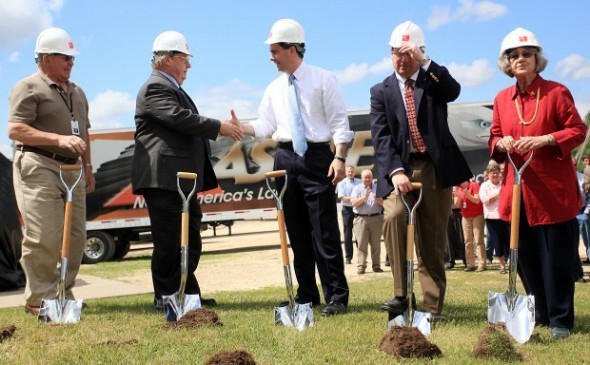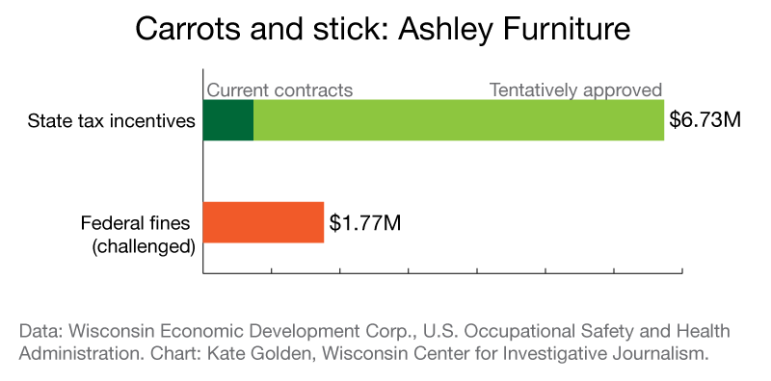State Subsidizes Company With Safety Violations
Ashley Furniture gets $6.7 million from job agency, has federal fines for more than 1,000 worker injuries.

Gov. Scott Walker shakes hands of Ashley Furniture employees at a 2012 ceremony celebrating the company’s Whitehall expansion. The company is eligible to receive $6.7 million in state tax credits, nearly four times the amount of federal fines it faces for allegedly violating worker safety laws. Photo by Andrew Link/Winona Daily News.
A Wisconsin-based furniture company facing nearly $1.8 million in federal fines for workplace safety violations stands to receive up to $6.7 million in tax credits from the state’s top job creation agency.
Under two contracts awarded in 2012 and 2013, Ashley Furniture is eligible for up to $735,000 in tax credits from the Wisconsin Economic Development Corporation for creating 243 jobs at two state manufacturing plants. The privately held company, which bills itself as “the largest manufacturer of furniture in the world,” has already collected $260,040 in tax credits under these contracts, according to the online WEDC database.
Ashley is also pursuing $6 million in tax credits, for which the WEDC board has given preliminary approval, to proceed with a $35 million expansion of its headquarters in Arcadia. The contract would keep 1,924 jobs in Wisconsin but not require the company to create any new jobs.
Ashley said in a statement to the Wisconsin Center for Investigative Journalism that the project for $6 million in tax credits is pending, with a final decision expected in the next 90 days.
Company representative Jason Lockington declined comment on whether U.S. Occupational Safety and Health Administration citations, announced Monday, would affect Ashley’s current and pending contracts with WEDC.
Ashley is facing fines for more than 1,000 work-related injuries over a three-and-a-half-year period at the company’s Arcadia plant in Trempealeau County, according to a statement released Monday by OSHA.
Under WEDC’s standard contract for economic development tax credits, recipients must be “in compliance with all laws, regulations, ordinances and orders of public authorities applicable to it.” But there are no specific provisions regarding workplace safety.
Assembly Minority Leader Peter Barca, D-Kenosha, a WEDC board member, said he was “deeply concerned” about the OSHA citations. He suggested that WEDC needs to do more to hold companies with poor safety records accountable.
The injuries reported by OSHA included one worker losing three fingers in July 2014.
“Ashley Furniture has created a culture that values production and profit over worker safety, and employees are paying the price,” U.S. Secretary of Labor Thomas Perez said in the statement.
Steve Ziegeweid, director of health and safety at Ashley, touted a 14 percent decrease in incident rate over the past five years and called employee safety “an absolute priority.”
The company, according to Forbes, had annual revenue of $3.85 billion through October 2014.
OSHA, part of the U.S. Department of Labor, identified 1,037 workplace injuries at the Arcadia plant from Jan. 1, 2011 to July 31, 2014, spokesman Scott Allen said. The company was cited for 38 violations, including 12 “willful violations,” 12 “repeated violations” and 14 “serious violations,” and faces fines totaling $1,766,000. According to OSHA, willful violations are those committed with “intentional, knowing or voluntary disregard” for the law.
Subsequently, the company has been placed on the Severe Violator Enforcement Program “for failure to address these safety hazards.”

City and county officials, as well as Gov. Scott Walker, take turns breaking ground at Ashley’s Whitehall expansion in 2012. The company stands to receive $675,000 for adding and retaining jobs at this plant. Photo by Andrew Link / Winona Daily News.
“Private companies that receive economic development assistance from the state should be held to high standards — especially when it comes to worker safety,” WEDC board member Barca said in an email. “WEDC needs to do everything possible to establish standards to ensure companies are complying with state and national laws and develop clawback provisions when any company has serious violations of the law.”
Greg LeRoy, executive director of Good Jobs First, an organization in Washington, D.C. that tracks state economic subsidies, said “repeat offenders of federal or state laws should be disqualified from getting economic development subsidies.”
Mark Maley, spokesman for the WEDC, did not respond to repeated requests for information about whether the state’s contracts with Ashley might be affected by the OSHA citations.
WEDC’s pending $6 million contract with Ashley is for an Enterprise Zone Tax Credit, awarded in areas the state deems to be economically distressed. WEDC uses the unemployment rate, median household income and other measures to designate certain areas as enterprise zones. The company then must hire or retain employees who live in that zone.
Ashley has also been awarded two contracts, for $675,000 and $60,000, through WEDC’s Economic Development Tax Credit program.
The larger contract calls for creating up to 225 jobs through the end of 2014 and maintaining 376 jobs through the end of 2016 at the company’s plant in Whitehall. The smaller contract, with deadlines into February 2016 and 2018, requires Ashley to create up to 18 new jobs at its plant in Independence.
Ashley had created just 80 jobs as of its last reporting, according to the WEDC database. The company will report its final job count for 2014 in March. WEDC must then verify that the jobs were created.
In 2014, WEDC dispersed more than $156 million in financial assistance, with $79.1 million distributed as tax credits.
WEDC economic development tax credits can be used to offset Wisconsin income or franchise taxes, standard contracts state. If the tax credit exceeds taxes due, the unused balance can be carried forward for up to 15 years.
-
Wisconsin’s Medicaid Postpartum Protection Lags Most States
 Feb 27th, 2024 by Rachel Hale
Feb 27th, 2024 by Rachel Hale
-
Wisconsin Has A “Smart Growth” Law To Encourage Housing, But No One Is Enforcing It
 Dec 22nd, 2023 by Jonmaesha Beltran
Dec 22nd, 2023 by Jonmaesha Beltran
-
Milwaukee County Is Funding Affordable Housing In Suburbs
 Dec 21st, 2023 by Jonmaesha Beltran
Dec 21st, 2023 by Jonmaesha Beltran


















I went to a breakfast event sponsored by the Business Journal which had the Pres of Ashley as a key note speaker. It was a waste of money because it was basically a pep rally for Walker. Now I know why.
Great example of Walker corruption, pay to play, and Ashley abuse of workers. I would never buy any of their products.
Let’s see if the J-S picks this up!
Follow the money–
http://www.wisdc.org/index.php?module=wisdc.websiteforms&cmd=searchadvanced&filter=+Search+&employer=Ashley+Furniture+Industries&qty=100
You mean this Bruce? http://www.jsonline.com/business/ashley-furniture-fined-for-workplace-safety-violations-gets-state-tax-credits-b99440490z1-291119501.html
Or do you mean a follow up with further investigating?
I know companies sometimes claim that OSHA or other regulatory agencies can be overzealous and unfair, and I am not familiar with a workplace like Ashley Furniture’s, but more than 1,000 violations in 3 years sounds like an awful lot.
At least Ashley Furniture creates jobs in Wisconsin. Mary Burke and Jim Doyle gave over 12 million tax dollars to Abbott Labs and they did not add one single job in Wisconsin. HUD came back and said these giveaways were improper and now Walker is faced with cleaning up another huge Doyle mess. The State of Wisconsin negotiated a settlement and is now paying HUD $8.1 million to rectify this. This was one of 4 improper monetary awards made by Burke and Doyle. Bruce, you can find this in today’s paper.
So 1,000+ violations is no biggie because they create jobs? What does Ashley’s violations have to do with Abbott?
I don’t recall saying it was ‘no biggie’. You might want to re read my post. It’s quite simple, Ashley Furniture is a job creator. They are responsible for thousands of jobs here in Wisconsin. Because they create so many jobs, they are eligible for some state funding. The previous Governor handed out more than twice as much money to a company that never created one more job in this state. Also, as it turns out, the money was given improperly and now must be paid back. I realize your inclination is to rail against Walker for most everything. I think there are a lot of people like David on this site who are more concerned that the Ashley people are Walker supporters. It looks like OSHA is checking into things so that the people who voluntarily work there will be protected. In the meantime we should celebrate the success of this company.
Really, Chris? Ashley is a “job creator” and therefore entitled to my tax dollars? I’ve got news for you. Ashley is a business. They are in business to make money. In order to stay on the right side of the law as a business, they need to follow certain regulations like making sure every attempt has been made to prevent their “voluntary” workers from losing their limbs making the product that they sell to make a profit.
In other words, it’s 2015. Not 1915.
Hey Dave, I am well aware that Ashley is a business. We need to encourage these businesses to grow and expand in our state. Burke and Doyle gave out even more of your tax money to a company that did not create even one more job and they did it improperly. That is a true scandal. Also, point to where I said we should give money to Ashley. Ashley will correct the issues and continue to create a fine product and more jobs. You use terms like profit and business like they are a bad thing. I do not understand the hostility the left has toward private business.
Again, this is not about Abbott. And rail against Walker? I said nothing about him here.
“In order to stay on the right side of the law as a business, they need to follow certain regulations like making sure every attempt has been made to prevent their “voluntary” workers from losing their limbs making the product that they sell to make a profit.”
Looking through the case against them, it certainly seems like they’ll end up settling for at least a portion of that fine. Clearly they need to do more to address this, or OSHA will make it more expensive to pay the fines than to fix the problems. That being said, the worst case I could find in any story was a three finger amputation. Not exactly “losing their limbs”. Still a serious injury, and they should do what they can to mitigate the risks, but they’re working through that fight with OSHA now. (Also, because PMD loves when I nitpick: They have 24 violations that resulted in these fines. There were 1000 workplace injuries of varying severity in the last 3.5 years.)
The real question raised here is what weight this should have on WEDC. Ashley hasn’t even finished the OSHA process, and the suggestion here is that it’s improper for the state to provide tax credits for job creation. Should the state be doing OSHA’s job? If Ashley wins the appeal and the fines are dropped (an outcome I admit is unlikely), then should WEDC still withold the tax credits, to avoid the appearance of “pay to play”?
What does OSHA consider a workplace injury? If you stub your toe at work, is that a workplace injury? How serious does it have to be? Because 1,000+ in 3 years sounds like a lot, but I have no idea what OSHA considers a workplace injury.
If there are serious allegations of unsafe workplace conditions at Ashley, should that give WEDC any pause when considering whether or not to award tax credits? Did they look into it and decide it’s not serious?
An OSHA recordable incident is usually one that takes the employee away from work and requires some attention from someone other than themselves. Stubbing a toe or a papercut shouldn’t qualify, but thinking you broke your toe or piercing/cutting your hand with a staple (trying to think of actual furniture assembly things) would. From other stories, it looks like 100 of the 1000 injuries were related to the machinery that’s the primary problem. The others are probably smaller injuries related to having speed incentives but not safety incentives. These happen everywhere, but averaging 1 a day is a lot for most industries. I can imagine furniture assembly being higher, but it still seems awfully high.
As for WEDC, I trust the story that they looked at areas that need extra stimulus and found an employer that could reasonably add jobs. I doubt they looked in what OSHA might investigate and just noticed that there was nothing that appeared to compromise Ashley’s ability to create the jobs. This fine might change that equation, but then again, if they don’t create the jobs they don’t get that portion of the credit. Once Ashley exhausts their options to appeal, it would probably be a good idea for WEDC to at least re-examine their ability to create jobs. I just don’t see the big case against WEDC’s actions thus far.
Injuries are self reported and the guidelines vary by company. The important measure I’d like to see are injuries that result in the need for medical care. I’m not worried about cuts, jammed thumbs, or a sore back (usually)… however even these are generally considered recordable if it means someone loses work time or they have restricted work for a bit. But we’d have to see the specific list of Ashley Furniture’s injury list to know what we are really talking about…
@Chris Byhre, such faith in a private business. They’ve had three years to “correct the issues”, how’s that going?
Since they are such upstanding corporate citizens, I suppose we could just disband OSHA and everything will work itself out, huh?
” Ashley refutes the allegations, saying in a statement it “strongly disagrees with each and every one of the agency’s assertions and believes the proposed penalties are grossly inappropriate and overzealous.” ”
Working in an industry where injuries and deaths occur each year, it is particularly disturbing to see a company officially issue above statement showing they have little regard for workplace safety and do not take this seriously.
Hey Rich, I don’t think your idea to disband OSHA is a good one. You might want to give that more thought. I for one, would not support it. I will focus more on supporting companies that bring high paying jobs to WI. I do have faith in private business and struggle to understand the left’s distaste for it.